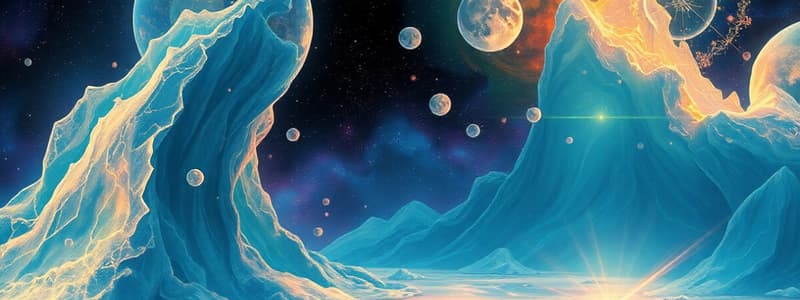Podcast
Questions and Answers
What describes the arrangement of particles in a solid?
What describes the arrangement of particles in a solid?
- Particles are far apart but maintain a fixed shape.
- Particles are far apart and move randomly.
- Particles are closely packed together in a random arrangement.
- Particles are closely packed together in a regular arrangement. (correct)
Which statement is true regarding the properties of liquids?
Which statement is true regarding the properties of liquids?
- Liquids have a fixed volume but do not have a fixed shape. (correct)
- Liquids have both a fixed shape and can move freely.
- Liquids can be easily compressed.
- Liquids have a fixed shape and fixed volume.
Which process occurs when a liquid turns into a gas?
Which process occurs when a liquid turns into a gas?
- Condensation
- Evaporation (correct)
- Melting
- Freezing
Which state of matter is characterized by being easily compressed?
Which state of matter is characterized by being easily compressed?
What happens to a solid when it absorbs heat to become a liquid?
What happens to a solid when it absorbs heat to become a liquid?
Flashcards are hidden until you start studying
Study Notes
States of Matter
- The three states of matter are solid, liquid, and gas.
- Solids have particles that are closely packed together in a regular arrangement.
- Liquids have particles that are close together but can move around each other.
- Gases have particles that are far apart and move randomly.
- Solids have a fixed shape and volume.
- Liquids have a fixed volume but not a fixed shape.
- Gases have neither a fixed shape nor a fixed volume.
- Solids can change to liquids through melting.
- Liquids can change to solids through freezing.
- Liquids can change to gases through evaporation.
- Gases can change to liquids through condensation.
- Solids cannot be easily compressed, while liquids are only slightly compressible, and gases can be easily compressed.
Studying That Suits You
Use AI to generate personalized quizzes and flashcards to suit your learning preferences.




